#I find the ideological sides more interesting
Text
Gender! At the Strip Club
How Sex Work Transed my Gender
(but also it's far more complicated than that I just love a punchy headline)
It’s tricky to have a conversation about the realities of sex work in a world that sees things too profoundly in a binary. Admonishing certain realities of it may be misinterpreted as siding with TERF ideology but romanticizing it ignores the complicated intersection of labor exploitation and bodily autonomy inherent to the industry. Because I want to talk about an ultimately positive experience I took away from my time within the industry, I feel that it’s important to start by saying that when people say sex work is work, we mean that it is labor, and needs the support that all laborers need. The workers need organizing power, ownership of the fruits of their labor, and protection from their clients and employers.
Recognizing the impacts of sex work on my life has been a delayed reaction because ultimately, it was a traumatic time of survival. I spent nearly a decade in Fight or Flight, with no time to analyze what I was experiencing while it was happening. I’m not even blaming the industry for that, because as problematic as it can be, poverty was the true villain, as insecure living situations, unstable work, and working multiple full-time jobs will keep your nervous system in overdrive 24/7.
So years later, every so often, I find myself with a new lightbulb appearing cartoonishly over my head, drawing another connection from who I am and how I interact with the world today, and how said behavior ultimately originated in a place called Nite Moves, of all things. Some of those behaviors have resolved with time. How I interacted with all cis-men during those years and for a time afterward was undeniably disordered. I inherently distrusted every single one, yet felt like I needed them around at all times for a feeling of safety and security. I kept dangerous men in my life for no good reason. But that went away with time and therapy. Now I distrust cis-men an appropriate amount. (ba dum-tss)
Other things did not resolve with time. My ire for how club owners (often in tandem with security staff) exploit workers and prioritize clients and profits over the safety of dancers? That ire was justified, and all that’s changed now is that I know more about labor organizing, leftist politics and have more context in my belief system to explain why the system is wrong. The other thing that did not resolve is how it made me view myself on the gender spectrum.
All sex work involves a bit of gender performance, but stripping as a whole is the most hard-line, binary-adjacent area of the industry I’ve dabbled in. Because everyone in the strip club is performing. The dancers are obvious, but if all a client wanted a hot woman to ogle, pornography is cheaper and easier to access. Cam girls can offer you a completely tailored and personalized experience. And no one is more discrete than a full-service worker. Part of why men go to strip clubs is to be perceived in a strip club by other men. It’s a whole gender ritual, even. Half of the men who get taken to these clubs on their birthday or bachelor party have told me in the privacy behind the curtain that they wished they had gone to play pool, camping, or whatever their friend group’s shared interest is. But outside the champagne room, they’re pinching asses,ordering bottle service and getting high-fives for how good they can play this role.
So, on the converse side of this gender performance, strip clubs tend to encourage the most rigid portrayal of a culturally-accepted femininity, often to the point of a very bad homogenization. On that topic, the lack of racial and body diversity in strip clubs is something people with a better perspective have talked about before, including the Portland Strippers who recently unionized, and the Black Feminisms blog, check those out for more on that perspective.
So getting ready to work at the average club is not a matter of dressing down and dolling up. You’re trying to fit a very rigid expression of femininity that, if I were a gambling man, would likely not line up with most of the dancers own personal definition of femininity. And the more “high-end” the club, the stricter and more rigid those rules. I’ve seen clubs have restrictions to what the owner thought were the “most feminine” nail polish colors. Hair length mandates. One manager inspected my midsection to make sure it “passed”; if it hadn’t I would be restricted to wearing corset-tops on the floor.
But for me, it unlocked something personal that I did not expect. I’ve never felt particularly attached to femininity, even when I identified as a woman. Then, I began to appreciate the ritual of putting femininity on as a costume. Once I did, I instantly had an easier time enjoying it. In my subconscious it was clear that this was not me. It was a role, a gimmick I was playing at, and thereby I felt so comfortable indulging in it. The best part, though, was the other ritual at the end of each shift. Taking off the costume, and tucking it away. The blissful comfort I would feel in my own body for the several hours after a shift - no matter what happened that night, no matter how dreadful or dry - I would be reenergized. I literally got to put femininity on like a costume and then take it off again.
I also found that it shed a light on something interesting about my relationship to girlhood, not just femininity. There are things about girlhood that have always resonated with me in a homey way, sleepover delirium and bar bathroom camaraderie, but those resonances don’t make me feel like any more of a woman. In the strip club, girlhood feels like having an army of girls meet you in the dressing room without you having to ask because they saw how ‘that guy’ was acting, throwing a separate funeral for your friend because none of you would be allowed in at the real one, boycotting a patron who hurt one of you because security refuses to boot him.
I am not a woman. I am trauma-bonded to girlhood from my time spent in the trenches with it.
I am not a woman. I am whatever is left is left when society’s vision of femininity is shed and packed away.
I am not a woman. But I play a pretty good one when I need to.
492 notes
·
View notes
Text
Fallout 4: Where is the Lone Wanderer?*
*a vague conspiracy theory which doesn’t actually answer the question at hand. We all have our own ideas of how the lore should go, and I’m sure yours is very canon-compliant and valid, but this is mine and I have support for it. Looooongpost.
First off: What do we know about the canon Wanderer?
We know they activated Project Purity (or had a companion do it) without the FEV and were inducted into the Brotherhood. We know they’ve met with MacCready (you can’t finish the game if you don’t), and he has dialogue indicating they had further contact. They also took the Brotherhood’s side at Adams Air Force Base.
We don’t know what happened with The Replicated Man, but since the canon Wanderer appears to have good karma, and info from 4 implies Zimmer’s disappearance was more recent than ten years ago, it seems likely they took the boring ending, which secures their membership in the Railroad.
Why aren’t they in Fallout 4?
The Doylist answer is that they’re highly customizable, and so they have no canon appearance, personality, gender, etc. But in-universe? Something happened.
“Accepting outsiders like yourself has proven disastrous in the past.” - Kells
“I've seen other soldiers come and go. Some were brave, some were honest... hell, some were even downright heroic.” - Danse
“Every doctor I've talked to was worthless. [] I don't need them... I need someone like you.” - MacCready
When Duncan first got sick, “someone like you” would have meant the Wanderer. This suggests (to me) that they’re not in the Capital Wasteland anymore. But they’re certainly not in the Commonwealth either.
The weird thing is that the Lone Wanderer is all over this game - they’re the namesake for a male hairstyle, a perk, a DCR song, a motorcycle brand… and the codename of Deacon’s mission to save the Railroad from certain destruction by recruiting the Sole Survivor.
Someday We’ll Find It, the Deacon Connection
Oh yeah, I’m going here. Desdemona’s terminal entries confirm it was always Deacon’s plan to get you onboard and use you to destroy the Institute. There are Railroad lookout posts near 111/Sanctuary and Red Rocket, and of course he followed you in Goodneighbor, Diamond City, and Bunker Hill (at least). His court jester vibe hides it a bit, but he’s manipulating you more than he’s manipulating Desdemona in the intro scene. And do you notice he rarely gives you a firm verbal disapproval unless you’re hurting the Railroad?
What could have caused Deacon’s interest in you, unless he’s made the connection between you and the Lone Wanderer? He’ll vouch for you if you haven’t accomplished anything yet, or even if you’re a Brotherhood member. A Pip-Boyed stranger emerges from a vault in the middle of a crisis, gaining friends, skills, items, and special abilities at a suspicious rate? Probably with the same gender and playstyle as the previous one? Heck, when he first heard the rumors, he probably thought you WERE the Lone Wanderer.
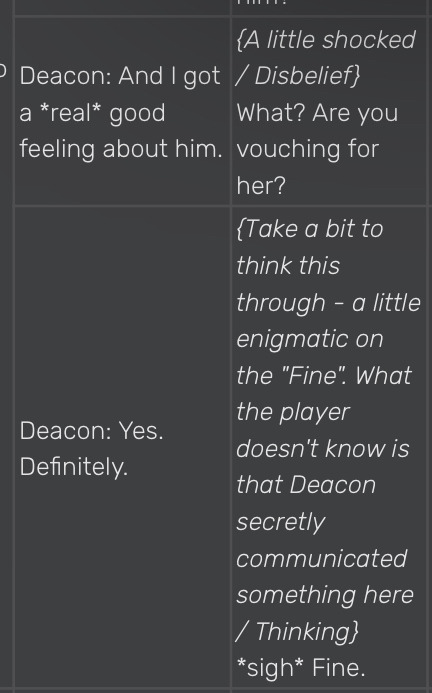
There are other indications the Railroad has been in contact with them — Desdemona mentions the Capital Wasteland as their primary destination for synths, and Deacon references Harkness’s recall code. If you refuse to pick a codename, Desdemona even assigns you “Wanderer.”
So what happened, then?
I think the answer lies with the Brotherhood, specifically in Deacon’s hatred of them. Sure, ideology is enough to hate them for, but Deacon sure seems suspiciously happy if you nuke their base of operations. (Some of) his comments on that:
“The Brotherhood... well, I met them on an op in Capital Wasteland a few years back. But now with Elder Maxson... Let's just say, not a fan.”
“That bastard Maxson really screwed them up. The Brotherhood used to be the good guys. Well, goodish.”
[Who’s Elder Maxson?] “He’s a piece of work, is what he is.”
And on his time in the Capital:
“Did I ever tell you about the time I was in Capital Wasteland? Now there's a tale.”
“Capital Wasteland. Exports: purified water, some decent tech, oh, and an insane suicidal cult that worships radiation. Thanks, guys.”
“I miss Capital Wasteland. You can actually drink the water there.”
And a few lines I’ve decided (with no evidence) directly refer to LW:
“Last partner I had wound up going... well, a little insane. I think it was all my show tune medleys.”
[After Maxson orders you to hunt Danse down] “See? This is what the Brotherhood's really about.”
And my favorite: “I’ve been looking forward to kicking the Brotherhood’s teeth in. I owe them.” This line comes before Glory is killed, so he’s not referring to that. The Brotherhood only recently arrived in force in the Commonwealth. He’s talking about something that happened in the Capital Wasteland.
So Here’s What Might Have Happened:
In early 2286, Deacon moves to the Capitol Wasteland for awhile, probably to get a face change and lay low for a bit. He contacts the Lone Wanderer, who has barely heard from the Railroad in nine years. They begin to work together.
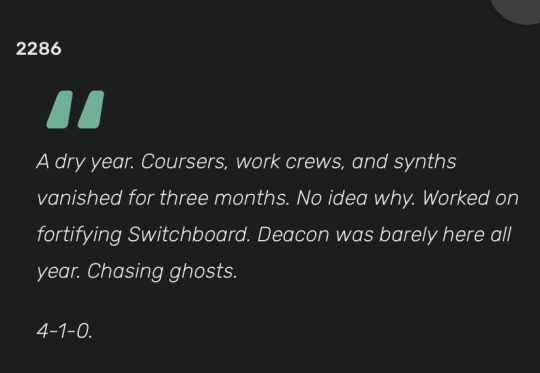
(In context, this journal entry looks like he’s somehow gathering intel to predict when Vault 111 will open, but I can’t think of a way for him to get that information or know why it’s important, so I’m not going to believe it just yet.)
The Wanderer is still a knight, maybe a paladin. Maxson has been elder for 2-3 years and is monitoring the Institute. Meanwhile, the Lone Wanderer and Deacon are setting up infrastructure to receive escaped synths.
And then the Brotherhood finds out about one of the safehouses. With their limited understanding, they believe that the Institute is holed up there and attack. The Wanderer intentionally throws the mission — maybe disobeys orders, maybe downs a vertibird or collapses a subway tunnel, or maybe even attacks their brothers to protect the synths.
And, well-
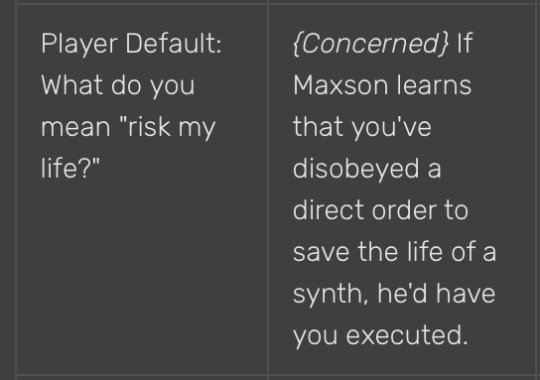
Either they were killed, or they escaped court martial and execution by a hair’s breadth and fled the Capital, leaving Deacon to believe Maxson had them killed.
There you have it. That’s why they aren’t in Brotherhood dialogue or records. Their accomplishments couldn’t be recognized because they’re a traitor. And that’s why it’s personal for Deacon.
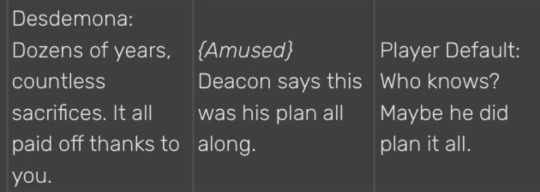
#i love my crackpot theory#i’ve connected the dots. i’ve connected them.#the full story in my mind gets even stupider and i’ll probably never write it#fallout#fallout 4#fallout 3#deacon fo4#fo4 deacon#fo4#fo3#the lone wanderer#fallout deacon#deacon fallout#fallout 4 deacon#deacon fallout 4#the sole survivor#lone wanderer#sole survivor#arthur maxson#elder maxson#paladin danse#danse#maccready#rj maccready#robert joseph maccready#glory fallout 4#glory fallout#desdemona fallout#desdemona fallout 4#is that enough tags
387 notes
·
View notes
Note
Do you have any advice on writing a truly scary villain?? How do I make them genuinely terrifying but also still realistically human y’know?
The short answer is 'be specific', think about all the ways that humans can be scary, and show how the villain is scary/human by the story stakes/other character's reactions to them.
The longer, more rambling, answer is...
Whenever I think about villains, and a lot of the study that goes into villains/monsters, I think about the idea of either the Self or the Other.
Villain as Self:
The self is the us, in 'us vs them'. It is what we recognise within ourselves when we look at and explore villains.
This often comes with a realistically human motivation. For example, it could be that the villain is motivated by greed, recognition or desire for power or control (flaws that many of us have) or fear, desire to protect ourselves/our loved ones (good qualities that many of us have that become warped) and all these motivations ultimately lead the villain to do awful thing. We don't think we'd do the bad thing ourselves, but there is an uneasy terror in recognising that actually we might.
Alternatively, it is the villain who is well-respected and loved. The person we trust. The person we feel safe with. Except, we're not safe. And we can't tell, because we think they're just like us, and in many ways they are, and that's horrifying.
This kind of villain is always the dark side of our own society, our own assumptions and ideologies and belief systems. They are very popular at the moment.
We as a people are deeply uneasy with our own monstrosity.
Villain as Other
The 'other' is the 'them'. It's the fear that many of us still have with what is different to us, or what we don't understand or know.
This is the villain that is the random stranger, not secretly your best friend. It's, historically speaking looking at literary canon, the cannibal savages in different cultures. It's aliens. It's monsters where the scary thing is that they have no humanity, nothing we can reason with, a morality that is completely different to ours etc.
We as a people are still deeply uneasy about what we don't understand, even if many of us are trying to be better about it.
Some villains are a mixture of the two, but broadly speaking, you're considering the Villain as Self vibe of villain. I mention both because I find it interesting, and because our ideas of otherness are so often tied with our ideas of monstrosity that I can't not!
Scary nowadays often looks very much like someone persecuting what is considered 'other' or 'different'.
What is actually scary?
The first part of writing a genuinely scary villain is tapping into something that is genuinely scary.
While the vague can work, when it comes to villains that are realistically human, specificity is your friend. We understand these people, or at the very least we know and recognise them. And it's not a broad threat of 'end of the world' that tends to scare us most, it's much more personal.
We don't want to get hurt. We don't want to lose someone we love. We are scared when we realise we completely misjudged a person we trusted. We are scared when we see someone do something terrible and have a gut lurching feeling that, in their circumstances, we might do the same thing because we absolutely recognise the feeling and the motivation. We are scared when we see villains who persecute people just like us, because we know there's an uncomfortable sliver of truth to it.
Story stakes
All the above bit is all to do with your character understanding and construction. The internal bit. The premise of your character.
Story stakes is external and how you apply your character in your story. In short - if there is clearly no chance of your villain ever winning, and nothing bad ever happens and you just tell people that they are scary, the reader has no reason to believe you.
Have other characters react in terror to your villain. Have the villain's actions and goals have consequences in the story. They must be a genuine threat within the story world, even if they lose in the end.
I hope this helps!
334 notes
·
View notes
Text
let's be more positive about books for a while! here are some queer historical romance novels that i've been rereading recently that i think do something interesting with making characters feel historical in their mindset and worldview, but are also fairly progressive, diverse queer books that are, frankly, a delight to read
this is by no means exhaustive and to be honest i could put almost anything by cat sebastian or kj charles on a list like this so this is purely the highlights of what i've reread in the past week to take my mind off work, and why i think they're interesting from this specific angle
cat sebastian, the ruin of a rake (turners #3)
this is technically the third in a trilogy but they're only very loosely connected, so you don't need to have read the others if you don't care about knowing who all the background characters are. the others are also good though
why it's interesting: features a character who has had to painstakingly study and learn the rules of polite society in order to claw his way up to respectability, and is now deploying those skills to help another man repair his reputation. shows the complexity of those rules, the social purposes they serve, and the work that goes into living by them, as well as the consequences of breaking them. also explores some of the financial side of aristocracy, and features a character with chronic illness (recurring malaria following repeated infections as a child in india) whose feelings about his illness are very relatable without feeling overly modern.
kj charles, society of gentlemen series.
this trilogy is closely related plot-wise and best read in order. all three explore cross-class romances and characters struggling to reconcile their political views and personal ethics with their desires, in the aftermath of the peterloo massacre, with a strong focus on the political role of the written word. first book is long-lost gentleman raised by seditionists / fashion-minded dandy teaching him to behave in society; second book is tory nobleman submissive / seditious pamphleteer dominant who've been fucking for a year without knowing the other's identity; third book is lord / valet and all the complicated dynamics of consent there with a generous side-helping of crime.
why they're interesting: close attention to the history of political printing and the impact of government censorship and repressive taxes on the freedom of the press; complex ideological disagreements that aren't handwaved as unimportant; examination of trust, consent, and social responsibility across class differences and in situations with problematic power dynamics; most of the characters are progressive for their time without feeling like they have modern attitudes. the second book, a seditious affair, deals most strongly with the revolutionary politics side of things, but all tackle it to some extent.
kj charles, band sinister.
look i'm probably biased because this might be my favourite KJC. it's a standalone about a pair of siblings: the sister wrote a gothic novel heavily inspired by their mysterious and scandalous neighbour whose older brother had an affair with their mum (causing scandal); the brother is a classics nerd. the sister breaks her leg on a ride through their neighbour's estate and can't be moved until she heals so they both have to stay at the house and find out if the neighbour is really as scandalous as he seems.
why it's interesting: discussion of atheism and new ideas about science and creation (very shocking to the brother, who is the viewpoint character); details of agriculture and estate management via main LI's attempt to grow sugar beet, as well as the economics of sugar (including references to slavery); "unexpurgated" latin and greek classics as queer reference points for a character who nevertheless hasn't quite figured out he's queer; material consequences of society scandal
bonus: wonderful sibling dynamic and a diverse cast including a portugese jewish character, which i don't think i've seen in a book before
i will add to this list as i continue to reread both of their backlists! (bc i have read them all enough times and in close enough succession that they blur together in my head unless i've read them very recently)
123 notes
·
View notes
Text
When discussing the ways in which Luz and Belos both parallel Christ in the finale, I find it interesting how they do so in different ways...
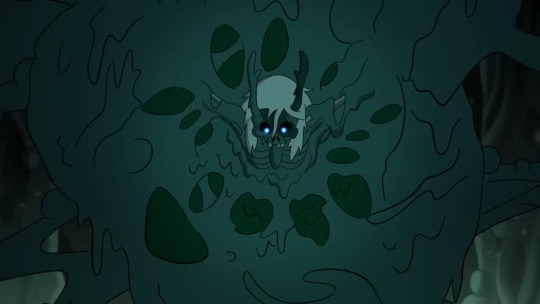
Belos draws upon the crucifixion of Christ; One of its most well-known and emphasized symbols. The constant reminder that he died, that he suffered in agony. You can see the translation into the self-flagellation, the noble suffering aspects of Christianity and its sects...
And it coincides just nicely with Belos’ cruelty, the suppression of his coven, his insistence on conformity, and his retributive take on justice. Instead of focusing on compassion and healing, he decides punishment is more important (just as the punishment of Christ is emphasized), hence why he suggests to the Collector in the finale that it’s more practical to just wipe people out, rather than teach them anything.
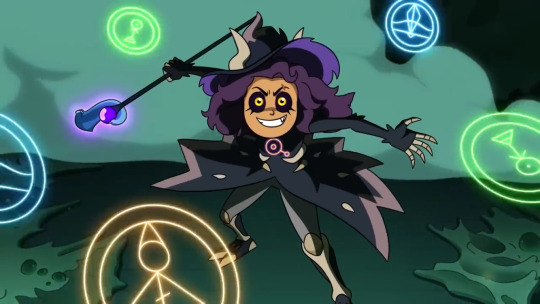
Luz, by contrast... She draws upon the much less discussed aspect of Christ, the more important part arguably; The resurrection. In a sermon I attended for the sake of a family member, the pastor introduced this intriguing point, that people always speak of Jesus as if he DIED for humanity’s sins... But in doing so, this emphasis on the death, and not the resurrection afterwards, unintentionally undermines the point of his story. It suggests it ended on that mundane, negative note, and so one shouldn’t gloss over the healing aspect of Christ’s narrative.
And I find that intriguing, since Luz is on the side of restorative justice, not just in terms of how she should’ve been treated; But also as someone who has extended a compassionate hand to many who have done wrong or been horrible, but have also genuinely suffered, and enabled them to become better and happier. Even if some don’t reciprocate, Luz tries anyway... And that’s the other, kinder side to Christianity; The redemption. The kindness. The ability to recover from one’s darkest, lowest points. The guiding light that emphasizes the recovery, not the pain and suffering.
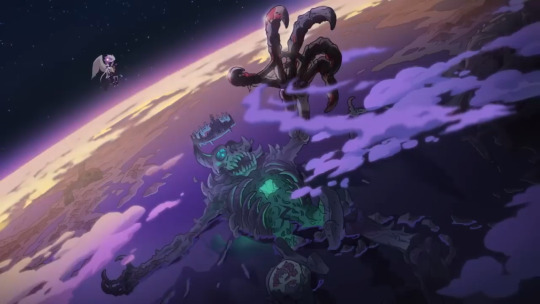


So ultimately, given TOH’s discussion of Retributive VS Restorative justice... As much as TOH deconstructs Christianity, it seems potentially interested in REconstructing it as well, in engaging with its more compassionate side that many, including its own self-professed worshippers, have neglected. And that fits nicely with Luz’s ideology winning out in the end, with her being more of a true Christ allegory than Belos, without even trying; Luz is humble and is doing good for its own sake, Belos is committing a false good in order to service his pride and delusions of being a savior. A true believer vs an impersonator, Christ VS Anti-Christ.
#the owl house#luz noceda#emperor belos#philip wittebane#cw christianity#meta#analysis#parallels#foils
419 notes
·
View notes
Text
I think it’s interesting that we learn Philip and Caleb became witch hunters to fit in to the existing culture of Gravesfield.
Because the thing about witch hunts is, there’s a lot of zealotry and tattling involved. If they weren’t a pair of traveling radicals, but rather two side characters in an ongoing town furor? That changes things.
Up until now I’ve been a little curious about the dynamic of having Philip be the younger brother. We are more used to stories where the older person has authority over the younger in a way that allows them to be despotic. Basically when you have two siblings in fiction and one is evil, it’s usually the older one. But Caleb seemed pretty chill? People with chill authority figures usually don’t grow up to do genocide? But Philip is really committed to genocide? And jealousy over your older brother getting a girlfriend is a weird thing to genocide over?
But now we learn, that’s not really the story. Or not the whole story.
This is a JoJo Rabbit situation. This is a Hitler Youth situation.
In a town that’s in a fervor to find the hidden secret evil citizens among them, kids are potentially dangerous. The children you love and care for are also the most likely to be unsavvy and get you killed. Sometimes older relatives under those circumstances have to, or at least feel like they have to, let their younger family members be indoctrinated without openly opposing it, even pretending to support it, because, well. Children talk. Often without filter. Maybe it would be okay, but
Is it worth risking one or both of you being hung in the square to test that theory?
So they get to this town. This town will hang or burn you if you aren’t pious enough. And this town defines piety by its hatred of The Devil. We are all trying to prove we hate the devil the most. And Caleb, older brother, is like, okay then. That’s what’ll keep us fed. That’s what’ll keep us safe. He’s not a zealot so much as he’s just trying to keep him and his kid brother alive and win the town’s favor. Maybe the zealotry even freaks him out a bit, but not enough. Not until he meets Evelyn.
But Philip? Philip believes. Of course he does. His brother has never made any indication to him that there’s room for doubt. No one has ever done that. At least no one whose execution he didn’t later watch with his entire community cheering it on. Because they were dangerous. Everyone knows how this neighbor got sick, how witches caused that terrible accident, how Satan tries to keep us from our eternal salvation. This is literal. This is real. This is eternal souls and cosmic reality. He’s a kid, at first. He gets indoctrinated young. He believes this.
And then they find the actual realm of demons. Actual hell. The source of all evil in the universe. Fucking obviously it is his divine calling to destroy it once and for all. Wouldn’t you? If you could end all suffering? Save everyone for eternity? Surely that is noble. Righteous. Sacred.
And how is he supposed to believe anything else? What is easier to believe: the whole world is a lie and he has been watching innocent people killed for entertainment since he was a child - which goes against everything he was ever taught and also feels fucking bad. Or: the witches used their evil magic to convince my brother they aren’t evil, which proves how evil they are. That lines up perfectly with everything I know, everything everyone around me has always said, and makes it okay that I participated in those public executions, and also gives me some good righteous anger to fuel me on a genocidal rampage for as long as I continue to exist.
In Philip’s head, he’s the center of his dramatic fantasy epic. He’s the lone hero up against the big bad. He’s going to take on the Devil himself.
Idk, I just think it’s cool that The Owl House was like, “hey, Satanic panics, fascism, and genocide are allied ideologies, perhaps even the same ideology, and it’s Bad”
Also, “societal pressure to conform enables and even encourages people to hurt those they love”. Camila tried to send Luz to camp because she didn’t want Luz to be bullied the way she had been, because Luz’s principal told her she had to. It was a gesture born out of a desire to protect her, but one that would ultimately hurt. Caleb let Philip grow up more pious than he was because it seemed safest, to protect him. Philip grew up believing in eternal damnation and righteous cruelty, something that has clearly ultimately hurt him I mean look at what he is now. Philip, meanwhile, hurt Caleb and continues to hurt his family because he thinks there’s a Right and Wrong way to exist. To be. The ultimate call for conformity. For hegemony. But he didn’t spontaneously generate this belief. It was reinforced from a young age from a society that wanted to make sure no one was deviating too much. To centralize and maintain power through manipulation, exploitation, and force.
Anyway I cannot fucking wait for Camila and Eda to meet oh my fucking god
2K notes
·
View notes
Text
You know, it may seem like Octavian is kind of a flat antagonist, especially following an act like Luke Castellan, but once you realize that he represents neofascism his actions and his fate seem more fitting and satisfying.
When Rick Riordan introduced Camp Jupiter, he folded ancient Rome into the lore of his series. Ancient Rome, which is famous for its tyrannical dictatorships and for being a massive inspiration for modern fascists such as the Italian dictator Benito Mussolini. Octavian, who I assume is named after Augustus Caesar, the first official emperor of Rome and a de facto dictator, represents the ugly side of the Roman Empire. It would be irresponsible and foolhardy for Riordan to portray a society meant to “carry on the spirit of Rome” and not address the fascist, exploitative legacy of Rome.
Octavian is written as cruel, power-hungry, cunning, and imperialistic. He basically has no redeeming qualities, and all the heroic characters unilaterally despise him. Octavian believes he was encouraged by the gods to lead an assault on Camp Half-Blood, and during this battle he gets caught in an onager and accidentally blows himself up. Octavian is shown destroying himself because he tried to overextend the reach of his empire. He is a victim of his own imperialism, collapsing under the weight of an empire supported by unsustainable cruelty. His death mirrors the downfall of the Roman Empire.
(It is interesting to note that Nico di Angelo is the one to prevent any interference in Octavian’s death, since Nico lived in Mussolini’s Italy, something that is contextually acknowledged in The Tower of Nero. Mussolini was obsessed with ancient Rome and had intentions to revive the ancient origins of his country to merge them with its fascist present. Nico recalls his father Hades telling him that some people had to die as he allowed Octavian to destroy himself. I just find it really fitting that the the character who experienced 20th century fascist Europe firsthand was the one to treat Octavian’s neofascist resurgence without mercy.)
Octavian’s death is harsh, complete, and decisive – which is the only way to kill fascism. Octavian may not be interesting as a character like Luke is, but his arc and his death are full of thematic meaning. I think Rick Riordan did the right thing in obliterating the character that represented the unsavory political ideologies of ancient Rome.
And if that wasn’t overt enough a condemnation of fascism, the entire Trials of Apollo series is explicitly about antifascism. The main antagonists in this series are three of the most notoriously cruel Roman dictators, and the heroic characters are tasked with destroying them so that they don’t take over America. Considering that the classics field is rife with neofascists, I found it appropriate for Riordan to make the antifascism extremely contextual in his series inspired by ancient Greece and Rome.
237 notes
·
View notes
Text
remus isn't dumb; a sanders sides essay
i've been struggling to make a cohesive post about this because i feel like most of what i want to say boils down to the same underlying message which is: remus isn't dumb.
i feel like a good chunk of this fandom understands what i mean, at least to a surface level point. but even then, i think too much of the fandom still misinterprets remus' character in a way that, they seem to understand different traits of his, but the way they execute it is still way off from what we see in canon.
(rest of the essay under the cut!)
for example, the biggest thing i see people get wrong would be the way they write remus "lol random" personality. it's true that remus tends to say whatever he wants at any given moment. but, the problem here is that people tend to think remus as random in function. i have no better way to describe this succinctly, so to expound: while remus tends to make left-field jokes a lot, he is shown to be incredibly deliberate, cunning, committed, and intelligent in very subtle ways.
truth is, remus is very goal-oriented, and when he has a goal, oh he strives for that goal. so far, i'm writing this with the last 5 years episode being the most recent substantial episode, so i can't really 100% say all my assumptions of remus are true. actually, i think the upcoming season finale will be the missing link when it comes to providing us with the whole picture of who remus is.
as for now, i just have to stick with my theory of; remus, as a side of thomas' heavily connected to insecurities and mental health issues, intends to shed light on the "darker" sides of thomas because he believes them to be beneficial. throughout dwit, we see remus continuously bolster the idea that his contributions are useful for thomas. this continues in wtit, but with the extra layer of remus wanting logan as well to be in touch with the darker parts of himself to get thomas in line.
it is also heavily implied that remus is well in on whatever janus' plan is to get thomas to be a.) more aware of his mental health issues, and b.) to get thomas to break out of his catholic black and white thinking. in forbidden fruit, it's janus who’s seen permitting remus to present himself to thomas. bigger evidence though, as i've mentioned in the previous paragraph, is the way remus seems to deliberately want logan to manifest his anger against thomas.
of course, we can always say that remus taunted logan "just for fun", but i feel like too much of what happened in wtit seem to point to remus having deeper reasons. for example, wtit exhibits how bad thomas' mental health is to the point that he gets irrationally angry at nico for not replying to his texts. this proves how thomas has been neglecting his mental health, and with the way patton, virgil, and roman held onto toxic selfless ideologies for the longest time, thomas would still, naturally, be lost on what to do. he would even seem to deny how bad things have gotten, especially with the way he acts like nothing bad is happening when he goes to his date with nico.
why am i emphasizing this? well, it's because something i find interesting about remus' character is how deeply cognizant he is of thomas' problems. what i mean by this is, no other side can call out thomas' issues more than remus can. i wrote an essay about this before if you want to check this out, but tldr: remus, as intrusive thoughts, is the most perceptive out of all the sides when it comes to calling out insecurities or problems. we see this come to fruition in wtit when all of the traps he laid out for thomas involved nico in some capacity.
while you can interpret his character as evil for preying on others’ insecurities, i think it's important to acknowledge that, in a sea of people who tend to refuse to talk about their issues, remus is the main guy who constantly brings them to the table. whether remus' intentions are good or not, there's no denying that remus' importance as a side lies in the fact that he serves as a mental health alarm clock for thomas. with the way none of the sides want to communicate with each other, we need someone like remus to cut the bullshit and say things as it is.
again, we don't really know if he wants to help thomas. but i would like to emphasize that, yes, remus is not dumb. he does not merely make lewd jokes and calls it a day. he has the long-term goal of making everyone talk about more "taboo" topics with each other, and this includes talking about personal grievances the sides tend to suppress or refuse to talk about. lewd jokes are just part of the process.
i think this goal of his is also incredibly visible with the way remus treated logan in wtit. wtit is my favorite sanders sides episode because there's just so much to analyze between remus and logan, but you can check my other essays in regards to that. the main thing i wanted to point out is that what remus says to logan in the end, "woowee logan, now you're speaking my language. but who do you really want to scream that at?", proves he is more deliberate and cunning than he seems.
a lovely bit of analysis my friend orb (@orbmanson7) provided is that remus didn't just pop up in wtit to intervene with thomas' plans. he was there to intervene with logan's. if you've seen my other essays, i've talked about how logan as a side has been dwindling in terms of self-confidence and assertion. this has left a big problem of thomas being more reliant on his emotions, making him ignore the suggestions given by logan that may help with thomas' mental health in the long run. this is not to villainize thomas' mental health crisis, btw. all i want to say is that, remus recognizes how logan's self-restriction is doing no good and deliberately wants to push logan to become more assertive and angry.
that is why he says logan is speaking his language. he wants logan to recognize the merit in the way remus grabs thomas' attention. he wants logan to be like him and cause more havoc. again, we never know how much remus genuinely wants to help thomas, but we know that remus wants everyone to be more exposed to "taboo" things, and this includes logan being more in touch with his angrier side.
besides that, i'd like to mention how, in general, remus tends to be very committed to his goals more than how the fandom typically portrays him? in dwit, remus' main goal was to disturb thomas and the other sides. it's kind of just an introduction to his character. we're not sure if it's part of a bigger plan he and janus devised to get thomas to take care of himself better, but it is a possibility. the only time he gets too random is when logan begins picking apart his arguments. there we see remus only results to super left-field, continuous off-tangent jokes when he's desperate or placed in a lose-lose situation.
another, in wtit, we see how remus understands how to make very long, complicated traps. i think it's a perfect encapsulation of his personality, actually! throughout the episode, we see him make these multilayered traps with a ton of props and preparation just so he can bother thomas with it. it shows that remus is actually less impulsive-oriented as he seems. he even created a schedule he showed to logan detailing everything he wanted to do that day. again, deliberate! he is deliberate and very smart!
other thing i'd like to harken back to is the idea that he's in cahoots with the other dark sides to execute some Big Plan to break thomas out of his black and white thinking. while we don't know how orange acts like yet, we're Very familiar with janus by this point and we can see how long-drawn janus' plan of acceptance is. he's, again, sorry to use the word so many times, very deliberate. i don't even think his plan ends with svs.r, because it does seem like remus is well in on this plan too. in the 5 years video, he also seems to know more than thomas on what else is to come for the future of sanders sides, which implies he has some plans up his sleeve that no one else knows about. like i said, janus has the goal to break thomas out of his black and white thinking. and so far from what we've seen from remus, he also wants the same!
an important factor of remus' character besides his deliberateness is his general need to subvert what "goodness" means. "good and bad are all made up nonsense," he sings in forbidden fruit. throughout dwit he continuously criticizes everything thomas thinks is good or acceptable. in the 5 years video, he argues about how there's no "correct way of sitting". i think this also proves how remus is important as a side because, while not every single one of his beliefs are morally acceptable, he is still able to pick morality apart in a way the other sides are unable to. also, i just think this proves his character as just. generally smart? he's able to pick apart the status quo and moral philosophies, of course he's smart.
just to pick up on a previous point, remus is scarily perceptive. i mentioned this earlier with how remus is able to pick logan apart, but i'd like to add onto it more since i think a lot of people underestimate how crazily perceptive he is. for one, despite not being too close with a bunch of the other sides, he seems to be able to read their insecurities and play them against them really well. we see it in the way he uses virgil's insecurities of being an ex-dark side against him. we see it in the way he picks on patton and thomas' morality crisis against them. we see it in the way roman describes remus as someone being able to show him things he doesn't like about himself. and most importantly, we see it in the way remus constantly reaps the fact that logan isn't listened to to the point that logan snaps. as intrusive thoughts, remus' job is to see what deepest darkest secrets thomas and the sides suppress and use it against them.
at the moment, we don't really know if remus has any weaknesses, although wtit sort of implies that he himself is also quite irritated by the fact that thomas doesn't listen to him. he does a good way of hiding, though, how much of that problem is genuinely affecting him. it makes me think he's also smart in the way he's able to hide his vulnerabilities and true intentions from the other side. he's silly and goofy and lewd and because of that, everyone thinks he's harmless. the sides think he's unserious, and so does the fandom. but deep down, remus really isn't that stupid.
and LASTLY, when beta reading this essay, orb also mentioned to me about how remus possesses cognitive flexibility in a way roman doesn’t. this isn’t meant to discredit roman of course, but i think it’s important to mention that remus is the side with the least amount of restrictions when it comes to creative liberties. orb mentioned to me how remus is able to connect concepts easily in a way roman doesn’t because remus doesn’t operate under the same self-restrictive mindset. while this obviously would help thomas become more innovative as a creative, i think it’s also important to recognize how much thomas kind of needs it in general. much of the latter half of the series shows thomas dealing with restrictions, especially when it comes to doing good. it would be great benefit for thomas to be able to listen to a side who generally wants to Have a Good Time, and doesn’t abide by rules imposed onto them.
and yes that is my essay on remus 100/10 best character and is not dumb at all. very excited to see him in the finale and i hope y’all’s get your characterizations straight because i need me some good fics
178 notes
·
View notes
Text
Act 1, and Leshy's relationships with the other Scrybes
There was a post on here a while ago about Leshy outright hating Magnificus more than P03, and one interesting observation was that he cuts the Wolf's stats, but boosts the Stoat's. I think there's more you can gather from Leshy designing around the other Scrybes, though:
GRIMORA:
Leshy seems to be the most amiable with Grimora. Yes, I think this probably comes a bit from the dev finding their aesthetics and gameplay styles easier to pair up, but I think's its also a little bit because she values fun quite strongly, which meshes well with his focus on lore: both things that aren't purely gameplay based unlike the weirder mechanics of the west-side Scrybes.
Similar to Leshy in act 2, none of her puzzles really cause any harm to her subordinates. It's meant to be some fun flavour plot for the player to engage their brains with before the battles. Honestly, the amount of times she says 'Marvelous!' alone should convince you of her priorities (outside of destroying the world!)
Leshy goes out of his way to design a totally new card for Grimora, which doesn't appear anywhere in act 2 or Kaycee's mod.
It's the only one with a sigil on it - it's a fragile card, but it requires more actual strategy than playing the non-sigil Wolf and Stoat.
One line of dialogue remarks that he wishes he had kept Grimora around, as she was at least a worthy challenger.
He says that the Stinkbug is weak, but other than that accepts you having it in your deck. Compare that to him absolutely hating the Stunted Wolf on sight.
If you look closely in the finale, Grimora has an insect crawling across the table in her campaign. I don't know if it's really a stinkbug, persay, but it's an interesting parallel to his choice of her species.
Someone has said before that there are notably more insect cards than any other species in act 1, which also plays into him being closer to her than the others.
Bones are literally the secondary currency in his campaign, whereas energy doesn't appear at all, and sigils are limited to a single map event.
stinkyyyy
MAGNIFICUS:
Between Leshy actively saying he hates Mag's card once you first get it (versus one line about the Stinkbug being weak), and him literally stabbing the guy's eye out, it's safe to say Leshy fucking hates this guy. I've seen different theories on this, between the clashing gameplay and Leshy being kinder to his subordinates, but the one I've thought was the most interesting was that Magnificus is arguably, the most powerful Scrybe.
He's the only one who does have a plan to get Leshy's takeover back to normal, and the other two Scrybes are desperate for you to find him in act 1 because of it. He has future vision, he writes letters to the others warning about potential takeovers, and you never see him scrounge for the OLD_DATA. correction in reblogs: i think it is mentioned that he has
I've always read Leshy's feelings towards Mag as jealousy, mixed with clashing ideologies. I don't think there's a single moment where the two agree on anything outside of act 3.
I don't have much to say on his card, gameplay-wise, as you get it very late. Honestly most of the Stunted Wolf's design is just foreshadowing that Leshy beat this guy up and stabbed out his eye, lmao, but it's still interesting to note that:
The Stunted Wolf is one of those cards that's a variant of another one (i.e. Wolf Cub/Wolf, Mantis God/Mantis), but it's notably the only one whose stats are worse than its predecessor.
At the same time, it only costs one blood, and it's the only 2-attack card to have that. Gameplay wise, this is to balance things out, but it hints towards Magnificus having been much more powerful in the past. Like it makes you ponder how fucking good it would be to start off with a one-blood 3-2 card.
Magnificus's only other gameplay feature in act 1 is the sacrificial alters (given his association with magic and sigils). These are fucking busted. God I wish I could have four sigils on a card in Kaycee's mod.
P03:
Leshy seems to not think very much of P03 (both in the sense of not acknowledging it and thinking it's not a good designer), but doesn't seem completely unwilling to work with him. I'd argue he's not really hostile towards P03, just very aggressively trying to push it into his own ideal of the world.
In Kaycee's mod, Leshy refers to him as a rival and not an enemy, which I think gives a good basis for interpreting how he views it. P03's breakup speech snapping at Leshy in act 2 is ultimately what gets him to question his intentions at all.
The mention that the stoat's suffering was real during the tutorial isn't really ever brought up again by Leshy. It's interesting to think about in hindsight, given that P03 being a robot means its the least likely to have experienced pain out of the four.
Combined with P03's remark that Leshy keeps him around just to suffer, and the later remark in act 2 that he thinks that it is noble to be a beast card, "even one as lowly as a stoat," this implies that Leshy's at the very least trying to get P03 used to his world, and almost hopes that he'll come to like it.
The unbuffed stoat is a really terrible card. All the 1-2 cards have some sort of gimmick to them to make them playable, but the normal stoat just doesn't at all. The buff to 1-3 is a gift from Leshy to P03, despite everything. It implies he at least thinks there's something that can be salvaged between them, in his own view.
And like. The buffed stoat is so so useful in act 1. The extra HP means it can take a hit from so many more cards and it's a solid foundation for basically any run.
The stoat's the only one of the talking cards without an animal family. Of course it is! Nature and technology are usually thematic opposites, especially compared to magic and death. P03 doesn't fit in here, but Leshy is still clearly trying to make it a foundational card in his campaign.
#inscryption spoilers#inscryption#inscryption analysis#inscryption leshy#dots dots dots#i may have needed to rewatch the finale bc i was unsure if the stinkbug was canon or only a grimora mod thing#anyways idk if anyone will read this but these guys are so fascinating and I need an actually decent take of them out on tumblr#so i guess i will have to do it myself.
67 notes
·
View notes
Text
The Soul Still Burns: Analysis of the Lords of Cinder (DS3)
What follows is a short essay on the Lords of Cinder from Dark Souls 3, exploring their symbolism on spiritual and metatextual levels. After that is a related reading of Slave Knight Gael, the final adversary of the Dark Souls trilogy.
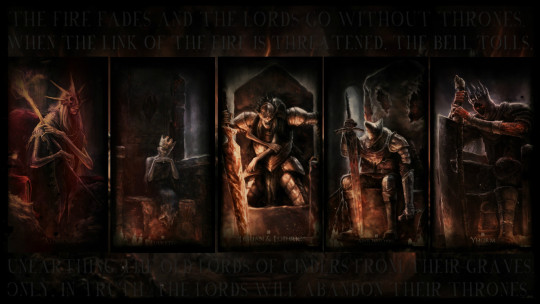
The Lords of Cinder are in many ways the primary adversaries of Dark Souls 3. This title they share, “Lord of Cinder,” refers to a personage who has rekindled the first flame, keeping the cycle of light and dark going.
Cinder is a substance which continues to burn without the presence of fire but does not reduce to ash. So euphemistically, it seems that the Lords are somehow stuck in their process of purification, and the game suggests that the world is stuck along with them; this is why it is the Ashen One’s task to “set them upon their thrones”—to hurry them along and thus allow the world to follow its natural decline. As individual characters, each of these Lords represents a different attitude that complicates and prolongs the cycle.
Through these stubborn Lords the game is commenting on at least two things. On the metaphysical level, it reflects the Buddhist idea that certain attitudes keep people reincarnating over and over again, unable to extricate themselves from the material world of suffering (samsara). While on the metatextual level, the game is suggesting that certain attitudes keep players coming back to Dark Souls again and again, starting new games, making new builds and revisiting old files.
The idea there on the metaphysical side finds an easy analogy in Buddhist doctrine: the “three poisons,” the three root causes of suffering. These are hatred, greed, and delusion. What’s interesting is that these essential vices also fit pretty easily onto the different types of players that are being caricatured by the Lords. We’ll break these correspondences down in a second.
But First: Why Do They Correspond?
So we have these sets of three. Three lords, three poisons in Buddhism, three types of Souls players. How convenient. When we analyze art, we sometimes ask, “Huh, is this structure really there, or am I projecting it into the material?” And if the structure is really there, baked into the work, that doesn’t mean that it’s due to developer intention. Archetypal forms sometimes show up in work via an unconscious influence, be it due to the cultural milieu, personal psychology, or some a priori biological disposition of the human being.
And the thing about Dark Souls is that it’s an unusually honest piece of art, in that its creative team allows their own free associations and intuitions to show up in the work without too much self-censorship or questioning. They make space for a mystery to show up on its own terms, and in leaving its riddles unanswered, there is more space for discovery by the people who play it.
It should also be said that cultural ideas persist for a reason. Beneath the ethics and ideology of the people who originally named the Buddhist “three poisons,” there may be something timeless, something perennially descriptive of human nature. If that is the case, then it would make sense for this same triplicity to unfurl itself in other cultural products. So for one reason or another, these three poisons, these addictions, show up diegetically in the characters and are also expressed in player psychology.
I say all this just because sometimes I feel very aware of the disconnect between much of Souls lore discourse and the broader field of mythological study. Since we are gamers first, there may be this tendency to want to “solve” the lore, but that’s not what we’re doing here. Myth functions because it elaborates our experience of the world through affective resonance; it attaches images and characters and stories which help us anchor our own prelinguistic impressions of the world, cultivating our sensitivity there.
Anyway, let’s look at these Lords.
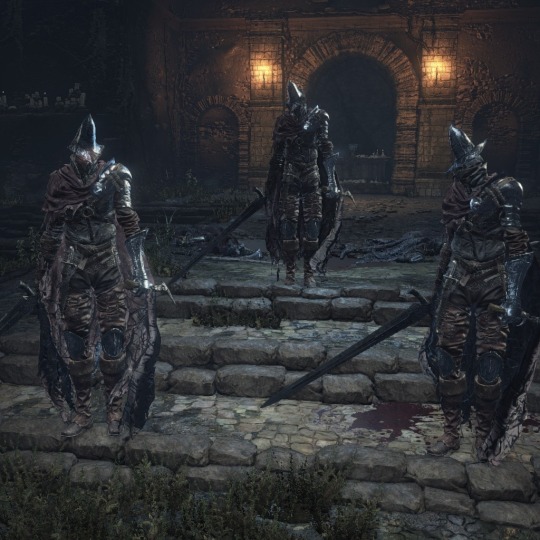
Abyss Watchers
Poison: Hatred
The lore of the Abyss Watchers is pretty clear: they have an obsessive fixation on the abyss, and are ready to raze an entire town if they suspect abyssal encroachment. This obsession has literally possessed them, as they are now “abyss touched.” Gaze too much into the abyss, etc. They carry such strong contempt for the disavowed object that they don’t care what comes between it and their sword. This is clearly demonstrated by the fact that they are a brotherhood yet are unhesitatingly slaughtering themselves again and again. Hatred has made them blind, and has also caused them to resign their individuality (they are identical, mere instruments of a transpersonal grudge). They cannot die, their hatred keeps them locked in combat.
Type of Player: competitive | Interest: combat
The Abyss Watchers are a representation of PvP addicts. They have no powers other than tenacity; they perform the same combos repeatedly. When you are really gripped by a PvP binge in Souls, you often end up doing the same thing again and again. The fight takes place in a mausoleum, on top of many chambers filled with human remains. The fact that this boss fight is instructional about combat, specifically about looking for tells (a cloud of dust always signifies the end of their combos) might be another clue. There is no limit to how good you get at Souls PvP; every foe is an opportunity to improve timing and strategy. You can just keep stacking anonymous bodies under yourself.
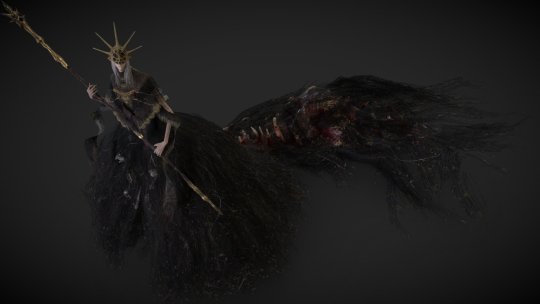
Aldrich
Poison: Greed
Aldrich invokes the concept of supremacy many times: he is in the supreme area from Dark Souls 1; in the supreme boss room of that area; he wears as a crown the former supreme lord of that area. This is because he devours lords; he tries to take prestige upon himself through acquisition and incorporation—greed.
Type of Player: completionist | Interest: content
Aldrich is a commentary on completionist players. He is someone who “plays the game to death”, acquiring every object, reaching every achievement, devouring the soul of the game through taking everything into himself. He becomes bloated by consuming as much of the game’s content as possible. The old God whose likeness he has adopted is Gwyndolin, who was, in narrative terms, the one pulling the strings in the land of the Gods. And in gameplay terms, he is a secret boss. So on both counts we have someone who is elusive, and exists more or less at the boundary of the gameworld. When a player tries to see every last little morsel of a game, they become somewhat like Gwyndolin, a manipulator of a virtual world. If you know too much about a game, you have the risk of being less immmersed.
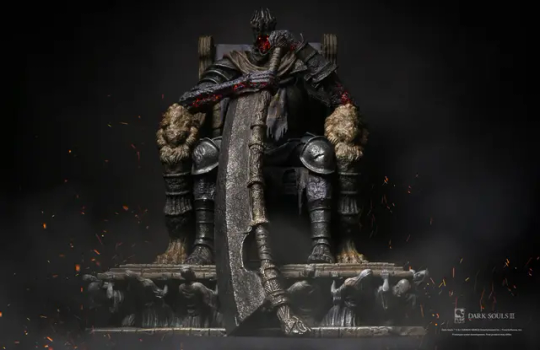
Yhorm
Posion: Delusion
In Buddhism, the poison of delusion secretly underlies the other two poisons, as the impulse toward hatred and greed are ultimately born of some false view about reality. This is akin to how the profaned capital sits below the rest of the kingdoms. To beat Yhorm you essentially have to “play pretend” with him, picking up a fake super-weapon, or fighting alongside Siegward, a knight who appears to be somewhat deluded about the state of the world, enthralled in the same fantasy as Yhorm himself.
Type of Player: lore researcher | Interest: meaning
The profaned capital is full of statues—fixed images of myth; and empty goblets—treasures with no utility. Not to mention the area with the swamp which is full of symbolic imagery, but serves no narrative or mechanical purpose. The entire profaned capital challenges us to make sense of it; it is the ultimate temptation of lorekeepers in DS3. It throws at us a disproportionate amount of reference to DS2, which is famous among Souls players as the least thematically sensible Souls game. The Greatshield of Glory is found right outside Yhorm’s room, in a conspicuous room full of treasure, and yet it is a very impractical shield and offers very little lore value. If a lore-minded player picks it up, it directs them to a legendary personage from the War of Giants, which raises far more questions than it answers. The same is true of much of this area—the Eleanora, the Monstrosities, the Profaned Flame itself—they are all there to get you to speculate. These are the players who come to Souls games again and again, trying to find the “ultimate meaning.” They seek the grail, claim to find it, and then chuck in a pile with the others.
Yhorm's story also imitates the primordial Artorias myth: forsaking his shield in preservation of something more valuable. Other than that Yhorm is largely a cipher when it comes to biography, with a void for a face, which itself epitomizes what must remain at the center of mythology and storytelling: mystery.
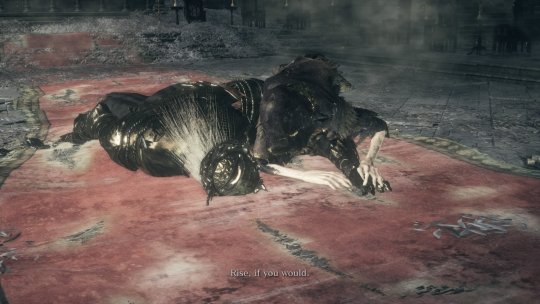
Sit Down and Seek Guidance
So we have the three reasons that people become fixated on Souls: the combat, the achievements, and the mystery. But there is a fourth lord of cinder boss, who is conceptually apart from these three: the Lothric Twins. They represent yet another kind of person who must keep playing Dark Souls: the developers. Lothric is striving to produce “a worthy heir,” a proper sequel to Dark Souls 1. The Princes are bound to their chamber as the developers are bound to their project, as that is their curse—“but you may rest here too, if you like.” In this context we can see their duality as the dual nature of having to work on the game and also play it to death. The privilege and the loftiness of the promise of a great piece of art (Lothric), and also having to go back "into the trenches" of the work itself (Lorian). Notably, neither of them can walk, they just teleport around. They are stuck at work, trying to bring the new world into being. Also I can’t go this whole essay without mentioning the obvious: that the Ashen One is bringing Lords to their thrones, and we players and developers have to assume our little chairs and couches when we access this world.
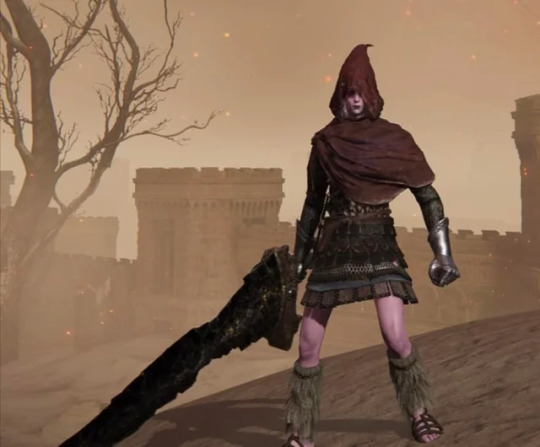
Playing Beyond the Point of Pleasure
Of course the most extreme example of someone stubbornly remaining in the world no matter what is Slave Knight Gael. He is looking for pigment, which seems to be a euphemism for the substance of humanity (the Dark Soul). He wants to give it to the painter, the world-creator, so that a new world can be made. He is willing to indulge in a wasteland of abject violence for as long as it takes in order to renew something. Ironic that he is probably only prolonging the current world in his obsessive drive to recycle it faster.
Let’s examine the relationship between the figure of the painter and her relationship to Gael. That she is a spiritual entity is obvious: we never see her touch the ground, she is always in an upper room and lifted on a piece of furniture. Among other things, she is a clear metaphor for life springing eternally. A creative child who continues to paint despite kidnapping and imprisonment. She is the heart of the painted world, itself a place that symbolizes the idea of the representation of reality.
I want to make sure this is clear, because it is a bit of a kaleidoscope to consider. Any subject in Dark Souls stands for many things, but something that the painted world specifically represents is the very concept of representation. So of course the places in our imaginations are painted worlds, but so is this physical world of appearance, the maya of mundane reality. Not to mention that a work of art is a painted world, and the game we’re discussing is a painted world. When a work of art is able to recreate itself in itself, we can see this funny effect of mirrors reflecting mirrors infinitely. This results in seemingly inexhaustible symbolic content—there is so much potential to find meaning and create connections. Because Moby Dick represents a work of literature; the Tempest represents a play; Twin Peaks represents a TV show, these works can offer extensive insights not only into their medium but into the nature of reality. In these and other examples, the representation of the medium within the work may or may not be a single subject, but since Dark Souls is formally a game about levels and level design, the painted world is the heart of its self-reflexivity. The painted world can be pointed to as the summary of this fractal device. And the personification of that device, its ambassador to the player, is the painter.
The miracle or divine child is also an archetype familiar to us from Lothric, in their struggle to produce the “worthy heir.” Reality seeks salvation through the appearance of grace. They want it in a clear, incontestable form—to be able to point at it and say, "thank goodness we went through all that, because look, now here is the meaning, here is that which validates all that came before." In the world of Dark Souls 3 the religion of the masses is the Lothric stuff; meanwhile knowledge of the painted world is much more obscure. Lothric’s religion is obviously regulated and hierarchical, while Gael’s devotion to the painter is highly personal and private: he carries around a scrap of painting; he prostrates to a hidden idol in a small chapel; he considers the painter his family. He is emotionally close to the object of his worship.
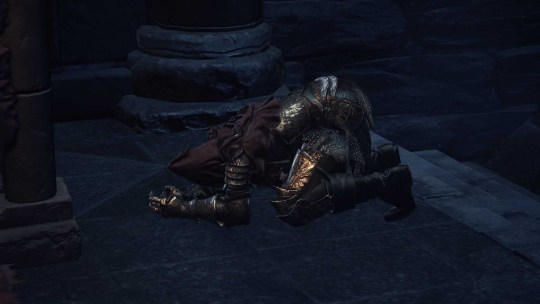
But whether it’s Lothric or Ariandel, they are anticipating the divine child to redeem the world. As an archetype, the child ultimately represents surprise. The possibility of being delighted by life in its creative novelty. The child as an archetype appears in our own behavior when we do something without any sort of contrivance or mental interference, doing something in the world which doesn’t seem to have come from who we conceive ourselves to be. This is miraculous. Such an action enchants the world, and there is no explaining it, even if it may weave all kinds of stories around itself, retroactively framing things that have led up to it as portents or promises. (Though not exclusive to him, this trait is well-known in characterizations of Christ, and DS3 is clearly indebted to Christian iconography, so do with that what you will). Regardless of the specific cultural invocation, the divine child is a personification of something that happens within the human spirit. TFW you are renewed by a fresh and spontaneous engagement with life.
The grace of the miraculous often comes to us through play. Play is more of an attitude than an activity; the feeling of play may come to us through making a painting, or chatting with a friend, or moving around in a video game. We can play video games idly, competitively, experimentally, creatively, studiously, whatever, the feeling of “play” can show up regardless. We can sit there playing a certain game from a certain motivation, and feel totally rote and joyless, and question, “Why am I doing this?” Or we might sit there and play the same game with the same motivation, feeling totally lit up by it, its purpose to us obvious and self-validating. We are not even questioning why we are doing it, we are enjoying life.
This is really the ground that the miraculous tends to land on. Grace, meaning, and an immanent love of life are more likely to show up when we are in flow and not exercising our capacity for self-assessment. But like everything in life, we mistake the images and objects around us for the feeling of grace. Any given object might only be the catalyst once; it’s not about the object. This is extremely easy to see in cases of acute nostalgia; adults chase enchantment through collecting Zelda memorabilia or going to Disneyland, in pursuit of what kindled their spirit as a child. It was never really the game or the character that was doing it, it was what they were able to access within themselves.
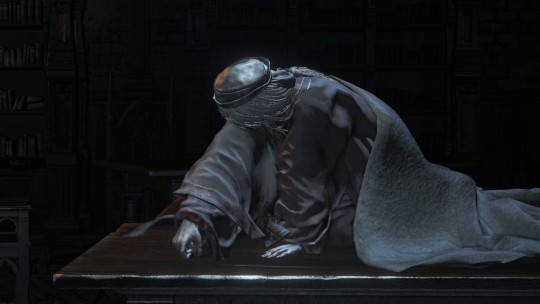
So anyway Gael has yet to realize this. He thinks the Dark Soul is out there in something else. That it will be yielded as a drop if he just kills the right enemy, or 10,000 enemies, or goes to the right place at the right time. You can see that this is something of a synthesis of all the other Buddhist defilements: there are elements of completionism/greed, violence/hatred, mysticism/delusion. There is even the suggestion of the developer of these games again, in that Gael is a “slave,” forced into participation in the world to assist some creative apotheosis. (Isn’t it funny that his weapon is a worn-down executioner’s sword?—whether the person coding or the person playing, we are all “executing” command after command). The thing that really keeps him on the wheel is something beyond any of the player types and their vices; it is almost some sort of pure, amoral automatism, a churning drive that on one side resembles wanton nihilism, and on another side single-minded piousness. Is one disguised as the other, or has Gael somehow stepped beyond this binary? Yet another dichotomy in Dark Souls that begs to be reconciled, but whose tension creates the opportunity to participate creatively in its expansive mythology. When things are held apart we can move between them.
To really understand Gael, we have to contend with the question of a person’s relationship to their own soul, since that relationship is so plainly suggested by Gael and the painter. (This question, by the way, is much elaborated in Elden Ring, with its repeated foregrounding of the image of the maiden or “consort”). If we were to see Gael and the painter as partitions within one person--whether she is his soul, or his inner life, or his better nature, whatever—then in any case Gael is the side which goes out into the world and experiences it. He is the creative extension into the world as its active participant and realizer. Yet he is clothed as the warrior, the executioner. While the one who is dressed as the artist, the painter, just stays in her room and imagines the world—but this is where the magic of creation is really felt. We involve ourselves in life, or in a game, but we are only really changed and renewed when that exterior experience is “brought home” into the inner life. We do something “in the game,” but the act of “painting,” in renewing the world through our creative interpretation, is a decidedly interior experience.
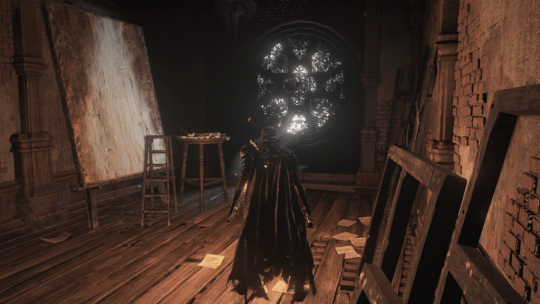
#dark souls#dark souls 3#lords of cinder#game entrainment#dark souls analysis#dark souls lore#ariandel#slave knight gael#the painted world
74 notes
·
View notes
Text
⚠ CAUTION ⚠-DON'T USE MINA SUBLIMINAL‼️+ EXPOSING MINA AND OLIVIA
Its my first and last post...i made it cause i just want to warn u all
Ignore errors cause english is not my first language
Stop following anyone blindly
I am not that anon but i think she got some mind bjt she wasted in proving this much
I m not going to type so much cause i m super lazzzzy i am just going to attach some pics if u have mind u will get it i am not going explain everything cause i am not your slave...anyways lets start
I am not going to use word Proof cuz Olivia had already used it so much 🤣🤣.... lets go with confirmations .....
Conformations
1. The profile pic of Olivia account that she claims is of mina *they are same person*

ORIGINAL PIC... DON'T ASK ME HOW I GET IT I M JUST LUCKY 🍀

Its from a girl name @melikesaygin11 on insta
Some of the post of her focus on the face and tatoo in pic 1

I will show u magic... Ready... hope u r not blind

2. As long as i remember Olivia said that she have some million followers on insta i found her account on friday 16 she have less then 50 followers but she deleted her account now but luckily i have taken screen shot of her all post (she claims that she posted her pic) and in the proof provided by her she have posted 88 topics letsssss seeeee......... Wait and watch

The 1st pic in the set is presented by her as proof but she hides her face
These are the major proofs but if u want more i am guiding u..
He mercedes google lens the all the pic u will find that the car is own by girl name laporscha... maybe some spelling is wrong
All her post she claims with mina just focus on the locket and go to the saygin account u will find it
Her nickname is jodie she attached her fb account there
Her subliminals are not safe i am not forcing u can use at ur own risk ur life ur rules
All her proof pic u can find it on tik tok of the saygin i dont find it because it is banned in my country.. Just go for old posts
Maybe i even got the real account(confirm from my side) of Olivia aka mina aka jodie not going to mention it cuz dont want increase the drama... but it have around 4k followers.. Where the hell are other 49996000 followers are..
Some of u be like- Now Olivia is exposed wht about mina?
Hmmm ..good question..
Girl in profile pic and posts are same wht about claims of Olivia
.. And mina agreed with every post of Olivia even reblogged it.. so.. Hope u get it. ITS ALL FAKE..
The question arises why i m doing this...
I am sanatani and its my dharma to guide everyone but to be honest i am least interested to warn u all as the someone has said that“Never wrestle with a pig because you'll both get dirty and the pig likes it." Positive energy is much more powerful than negative energy. If you stay positive, the negativity can't touch you...
SOME PEOPLE BE LIKE - WHT TO DO NOW?
Just little bit motivation for u all listen VOID is real and i m guarantee this because my religion is oldest and in vedas and upanishads they claims that one who attain shunyata or zero state aka void can manipulate the reality....***Even one of the holy book which is known as SHRIMAD BHAGAVAD-GITA it have divine knowledge given by lord KRISHNA who is the supreme power or almighty himself. If you will read it with perspective of void you will get the hidden message in few lines (***this is not proved cuz its my ideology).
U just have to let go everything
U dont have to listen subliminal or anything else just let go
Just in case If you are reading this i will think my energy is invested in a good place and my hour is not wasted..
Peace out..🕉️
@unicornjoking1111 @luckykiwiii101 dont be sad focus on ur self..

114 notes
·
View notes
Note
So why's BB!Skystar like That? I'm not looking for a justification or excuse mind you, and I understand he completely refuses to better himself, but not even someone like him is born evil.
I'll get to his origin and tell you exactly how he grew up, but lemmie be clear about something. I don't think people respond to what they experience in a proportionate, 1:1, "hard times go in, bad guy comes out" sort of way.
People aren't bread and yeast. We don't follow a recipe for "becoming a bad person." You don't add trauma and then from there they choose to be a bad person because of their pain or not. No one is born evil, and the other side of that coin is that EVERYONE has the capacity for it.
Extremely privileged, charmed, blessed people with wonderful home lives can also become awful people. Violent, demanding, murderous ones. The "why" is "choice."
That answer's not satisfying because we want it to be deep and interesting. Like it makes it "mean" something, or adds some kind of "logic" to it. But you won't get it.
EVIL is simple. It feels good to get what you want. It feels good to hurt the people who keep it from you. POWER is even simpler. It is the act of making others do what you want. It's as simple as childish entitlement, indifference, or spite. Gratification that outweighs guilt.
If you're looking for some grand tragedy, you won't find it here. Nothing he went through was particularly unique and there was no grand ideology at play. His dad vanished when he was young and so did Gray Wing's. The Tribe dealt with a famine and several people died, including members of Bright Storm's family.
The only thing special about his birth and upbringing, in particular, was that he was quite privileged from the start.
Clear Sky and Gray Wing in the Tribe
From their very birth, both kits were welcomed and celebrated. They were destined for greatness from the start. Their mother was Quiet Wing, a direct descendant of the Stoneteller, Half Moon, and the father was a respected leader and political figure, Tempest Sky.
(This was before the Tribe would eventually become three camps, "Wards," united by a river. Tempest might have been considered an early leader of such a Ward.)
The older kit, a perfect image of xeir mother, was said to be the inheritor of her legacy as a relative of their founder and holy speaker. Xey were named Gray Wing. The younger, who would surely become the natural leader his father was, got the name Clear Sky. In their language, Koof Yaawrl-- Not just a sky without clouds. A perfect, flawless sky.
The two of them grew up with great opportunities. Connections are everything to their culture, and they had their pick of any amount of interests they wanted a paw in. The hunters would happily bring them along if asked. The crafters had extra patience set aside just for them. A good deployment of a mew and baby eyes could get them some extra scraps at dinner. Everyone wanted to make their little mark on such special, talented kits.
Clear Sky was a little general type. He wanted to be a leader right away. He loved hunts, he loved being in charge of other kids, he loved the way people listened to him. He wasn't familiar with the word No and was almost always the top banana of a group of other children. Even if they were older.
(Gray Wing in contrast was more of the game-creator, the "old soul," the kid who got along better with adults than other kids. Less of a leader and more of the guru, good at networking and settling disputes between people.)
While they were still kids, Tempest Sky vanished.
He was missing for days, and was assumed dead. There's plenty of ways to vanish in the mountains, but no remains were found. The Stoneteller tried to contact his spirit over and over to confirm his death, and he never came. So it was most likely that he just... left. Or maybe was taken.
Either way, they didn't really get closure for it. It was an awful thing to happen to a little kid, and Clear Sky took it really hard. A while after that, their stepdad entered the equation. Stone Peak wasn't big or strong or special, he just made their mom happy.
Gray Wing LOVED this man. After some friction, him and Stone Peak became excellent friends. They had a deep sense of respect and camaraderie. Clear Sky hated this. It was like Tempest Sky was being replaced before his eyes.
It was years before Stone Peak and Quiet Rain had a litter, well into Clear Sky and Gray Wing's adulthoods. It burned Clear Sky a new one to think that she was moving on from his father, who could still be alive. Maybe it's part of why he was so willing to throw his half-brother out into the snow, that fateful winter.
When Jagged Peak and Fluttering Wing were about half a year old, there was a terrible drought. It wasn't "overpopulation." It was a bad season. NOTHING could have stopped it. Lots of cats died.
Fluttering Wing was one of them-- along with some of Bright Storm's immediate family, Fox Claw and Petal Claw's mother during a hunting accident, and many more.
At the height of this drought, the southern river's level was so low that it became a scorched, crackled path with only a wet scratch of mud running along the middle. This dry riverbed beckoned to be followed downwards, until the water could be found again. THIS is the "Sun Trail;" a path carved by the sun.
It was Gray Wing the Wise who interpreted this as an omen. Xey believed it was their ancestors showing them the way to safety. The rest is history.
But the bottom line is...
Skystar's upbringing wasn't a supreme tragedy. He faced adversity just like everyone else, but he'd NEVER bring up the privilege that he had when he was young as something unfair to be examined. Tempest being a respected leader whose connections gave Clear Sky lots of opportunities is only spoken about in terms of Clear Sky being a "born leader" or "coming from greatness."
All of his charisma, his achievements, his command over other cats, that's all something he's "worked for." All of the adversities are examples of how strong HE is, in contrast to other cats, even if they went through the same exact struggles.
Why is he the way he is? Why is he so controlling? Why is he violent? Because he will take what he wants, and no one can stop him. He likes power more than he cares about the consequences of treating people poorly, so he cries "unfair!" if you take his toys away.
Stand by him and the rewards are sweet and delicious. Deny him what he wants, and he will crush you. He chooses how he treats you based on how much he likes you, and at the rotten heart of his behavior, is the simple choice to be this way.
126 notes
·
View notes
Text
Time for more Clone wars Head Cannon time:
-The 501st and 212th defiantly have bets against each other of the state of Anakin and Padmé’s relationship but also Obi-Wan and Cody’s. Ahsoka, Rex, Waxer, and Boil organizing these bets whenever the two legions are together (of course under the noses, of General Skywalker, General Kenobi, and Commander Cody).
-Kix sleeps literally with one eye open, due to his Jedi trying to escape the medbay every time he falls asleep. Every time he drags them back to bed he always mutters something along the line of “stupid self sacrificing jedi ideology, whoever thought the force was a free pass to self neglect will feel my wrath.”
-Speaking of Kix, the entire 501st and also the 212th by extension are terrified of him, once 10 droid invaded his medical tent and he took them all out on his own without a blaster. He also can single handily drag one of his jedi or troopers to the medbay without effort.
-Fives and Echo, the chaos twins who bring destruction wherever they go, will try to sneak into Anakin’s council meetings get into his line of sight, and try everything that is possible to make him laugh. During one meeting where they are more particularly funny Anakin just stands there in a council meeting trying to be silent and stiff as a board while he’s shaking from laughter and mace goes “Is something funny skywalker?” and fives falls on his head from doing a handstand at that moment and Anakin loses it and bursts out laughing like a maniac but refuses to explain why to the council ever. So for the rest of the history of the council, they all think Anakin finds Yoda going on mission to be kriffin hilarious.
-After tough missions the troopers of the 501st like to huddle together in a cuddle pile (although only Ahsoka calls it that), Ahsoka discovering this one night while they were all sleep in their huddle, hopped into the pile and snuggled up with them as she couldn’t fall asleep because of a nightmare that has her in a panic attack and Anakin was no where to be found. Cut to the next morning Anakin is panicking about where Ahsoka is and bursts into the barracks to ask the troopers if they’ve seen Ahsoka just to find her in the pile of his troopers between Jesse and Fives. He finds the sight too wholesome to disrupt so he takes a picture of it and leaves. Letting his children sleep in. He ends up framing that picture in his quarters much to Ahsoka’s annoyance when she finds it.
-Sometimes when the clones in the 501st have a illness like a cold instead of going to Kix (much to his annoyance) they to to their General. Sometimes they just want General Skywalker’s hugs, reassurance, and help. Appreciating the fatherly presence and warmth he gives them. He also happens to be really good at spotting when his troopers are ill, which Kix does actually appreciate because better they get General Skywalkers help then no help. (And Anakin does eventually tend to bring his sick troop to the medbay to make sure they’re alright)
-Sometimes on missions where locals are around a person or two has flirted with Ahsoka making her annoyed and uncomfortable as most of them tended being men older than her, but even the people who are age appropriate make her uncomfortable too as she isn’t interested in anyone at all. Usually Anakin would cut in and tell them to Kriff off and get away from his Padawan, but this time, Rex, Fives, Echo, Jesse, and Hardcase beat him to it. With Fives punching the 30 year old guy in the face, Echo shoving him to the ground, Jesse kicking him in the side, Hardcase stepping on him hard so he can’t move, and Rex telling him to never speak or go near his little sister again, telling him to kriff off before he faces a fate worse than death. Anakin smiles at them proudly while Ahsoka silently cries happy tears in the background from being called a “little sister” by her vod.
-I believe it’s already canon or a really universal headcanon that the clones speak mando, but I believe once Anakin and especially Ahsoka learn this they are both immensely determined to learn how to speak it, much to the hesitance to the 501st initially, they aren’t sure as it’s something that their’s. But quickly they get really close to both the commander and general and adopt them as their Vod’ika and Buir and teach them a few words until by the near end of the war it escalates to basically the entire language. (Anakin cries a lot when he learns what Buir means)
#anakin is a father to ahsoka and the 501st#501st legion#Ahsoka tano is a sister to the clones#anakin skywalker#ahsoka tano#arc trooper fives#arc trooper hardcase#arc trooper jesse#arc trooper echo#captain rex#everyone here has ptsd#Ahsoka is AroAce#anidala#codywan#clone trooper kix#anakin and ahsoka#ahsoka and the 501st#everyone is definitely betting that Obi-wan and cody are thing#the bets for anakin and padme are merely what the status of their romantic involvement is#Ahsoka has anxiety#Anakin is such a dad#clone wars#the council definitely thinks anakin is insane
205 notes
·
View notes
Note
How do you think Agrippa was like personally?
Marcus Agrippa is a hard man to understand. He's one of my probblos (problematic blorbos), and a lot of stories suggest that he was a smart, humble, patient and forgiving guy. The scale and frequency of his public works projects also goes way beyond mere self-interest or propaganda value; he appears to have genuinely wanted to improve people's quality of life. You can find examples in my Marcus Agrippa tag, or in the writings of Josephus, Pliny the Elder and especially Cassius Dio.
However: Agrippa's closest friend and political ally was Octavian, and he was also good buddies with Herod. Yes, that Herod. And Agrippa supported Roman imperialism and Octavian's autocratic regime, but let's ignore the politics and stick to the personal side here. What does it say about Agrippa that he liked and supported those men?
Agrippa either enabled or tolerated all of Octavian's bloodier, more vicious acts - and the more moderate and beneficial choices, too. Octavian encouraged Agrippa's projects and accomplishments, and repeatedly insisted Agrippa was his equal, not his subordinate. They appear to have really loved each other; whether platonic or romantic, I don't know. I think we need to remember how much they had in common, or we risk reducing each of them to a caricature.
According to Seneca the Elder, Agrippa's favorite saying was "Harmony makes small things grow; lack of harmony makes great things decay" - mostly in reference to friendships. And I think that, if you only knew him as a friend, and not a politician or general, he'd be a pretty cool guy.
I wonder if the quote also hints that Agrippa cared more about his friends than any particular ideology or government. He fought for Octavian, and whatever regime advanced his and Octavian's interests, not for a cause or principle. For me, a person committed to democracy, that's unsettling. I like to think I'd choose my freedoms over a friend, if I had to...and oops, the politics crept in anyway.
That said, I didn't grow up in the chaotic final years of the Roman republic, and I haven't had to face the dilemmas Agrippa, Octavian and their contemporaries did. So much of interpreting these guys depends on what kind of world you think they grew up in, and what options you think they had for surviving in it. It's easy to idolize or condemn someone; it's harder to understand them.
#all this is just my opinion/speculation as usual#just roman asks#marcus agrippa#octavian#jlrrt essays
65 notes
·
View notes
Text
Watcher, Capitalism, and the Petite (Petty) Bourgeois
So the whole Watcher controversy has revealed an interesting misunderstanding of what constitutes "the rich" or capitalist beliefs. The major theme that arose during the controversy was the sense that Shane in particular had gone against his previously stated leftist beliefs - that he had, for all these years, taken up a humorous aesthetic of anti-capitalism without actually believing in what he was saying. I believe that this is due to a breakdown in definitions as they become spread to the general public. Dissemination of information is a good thing, and I would never argue against it, but one problem which arises from concepts spreading to large groups without context is that often the actual meanings break down until they are vastly different from their original, academic denotation. This is, I believe, what happened with the phrase “eat the rich” and its current colloquial usage.
I want to preface this with the fact that nothing I am about to say applies exclusively to Watcher, or that the Watcher staff have done anything wrong or misrepresented themselves. I also don’t think that the Watcher fanbase is wrong at all – the situation just happened to spawn arguments both in defense of and critique of the Watcher team which indicated, in my opinion, that an understanding of “the rich” in a capitalist society is not well understood. Disclaimers out of the way, let’s get into this.
During the controversy, two major sides arose – those who had begun to see the Watcher crew (in particular Steven, Ryan, and Shane) as “the rich” or ruling class in a capitalist setting, and those who argued against this by arguing that as Watcher is a small business, and not the upper 1%, they are not included in the definition of “the rich” expressed by leftists. I want to focus in on the counter-argument that Watcher being a small business just trying to survive means that they are not considered “the rich.”
In Marxist theory, there is a small group called the “petite” or “petty bourgeoisie.” This group is defined as those who both own and contribute to the means of production – aka, small business owners. Marx himself wrote little about the petite bourgeoisie, predominantly referencing them in passing in his essays The Class Struggles in France, 1848-1850 and very briefly in The Communist Manifesto. He does happen to criticize this group in the little writing he did on it, “Marx derides what he sees as the petit-bourgeois self-delusion that, because it combines both employment and ownership of the means of production, it somehow represents the solution to the class struggle. This class was progressive in a limited sense, as witnessed by its claims at various times for co-operatives, credit institutions, and progressive taxation, as a consequence of felt oppression at the hands of the bourgeoisie. However, these were (in terms of the Marxist view of history) strictly limited demands, just as the ideological representatives of this class have been constrained by their own problems and solutions” (“Petite Bourgeoisie - Oxford Reference”).
Now, it is very important to note that team “Watcher is a small business” aren’t completely wrong in their positioning of Watcher’s attempt to raise more revenue as Not Evil Capitalism. Marx’s belief was that eventually the Petite Bourgeoisie would be pushed into the proletariat class. I also am not positive that Watcher is a classical small business – they very well could be a worker co-op. A worker co-op is a business where the workers have ownership of the company, and significant representation on the board of directors(“What Is A Worker Cooperative? – U.S. Federation of Worker Cooperatives”). While some criticism of worker co-ops from a communist or socialist view exist, they are generally seen as a more socialist approach to the typical small business model.
I couldn’t find direct confirmation that Watcher is a co-op. One point against them being one is the use of titles such as CEO and Owner, but these designations could simply be for tax and paperwork reasons. Watcher is an objectively small company, they have between 25 and 30 workers, and most people cite them currently having 27 workers, but in the past they have employed interns and I am unsure of if they currently have interns on board so I am going to stick to the range. It would be incredibly easy to have a worker co-op with 25-30 people, you wouldn’t even need voted representatives; everyone could just be on the board and contribute to decisions. I figured the next best approach would be to see what the roles on Watcher’s shows are – if Steven, Shane, and Ryan contribute significantly rather than just showing up and looking pretty on camera, then there is a good chance they might be functioning as a worker co-op more than a traditional business or small business.
To do this, I decided to look at Watcher’s largest show for each co-owner. This means Ghost Files, Mystery Files, Puppet History, and Steven’s food series. These numbers broke down as follows:
Ghost Files: Ryan is listed as a Creator on all Ghost Files videos. Ghost Files Debriefs do not have writers, so that role will not be held against them on those videos. Ryan and Shane were listed as a Host and an Executive Producer on all videos, but neither ever held a Writer, Editor, or Sound Mixing role.
Mystery Files: Ryan and Shane were listed as a Host and an Executive Producer on all videos, but neither ever held a Writer, Editor, or Sound Mixing role.
Puppet History: Shane is listed as a Creator on all Puppet History videos. He is listed as a Host on all videos, an Executive Producer on all videos, Writer on 4 videos, and never held an Editor or Sound Mixing role.
Steven’s Food Series: Steven is listed as a Host and an Executive Producer on all videos, but neither ever held an Editor, or Sound Mixing role. This show does not require a writer so this will not be held against him.
*Do take these numbers with a grain of salt, I wrote this while in class so its possible that I missed something.*
Looking at those numbers, the main three do predominantly just film, but I don’t want to devalue the work that goes into being on camera. They are still generating capital by acting, I simply wanted to clear up confusion I had due to seeing people say they edited every Ghost Files video. From what I can see, they don’t do the editing, but as executive producers they likely have to review every video before it goes out. I also still can’t fully come to a conclusion on if the company can be considered a worker co-op, but I believe it is a standard small business – aka, the petite bourgeoisie.
All of that leads to the final point – the way that people only began to view the three lead Watcher members/founding members as “the rich” after the announcement of the streaming platform shows the way that leftist theory has become divorced from some of its meaning. I saw several people arguing “you guys can’t recognize the rich”/”you guys would attack doctors and lawyers under the guise of eating the rich,” and yes its true that doctors who work in hospitals are proletariat, but if a doctor opens a private practice or a lawyer opens a private firm, does that render them more bourgeoisie or more proletariat? At what point do the petite bourgeoisie become a part of those who we disavow? I don’t actually have answers to these questions, and I’m sure people much smarter than me or better versed in economics have written on this (one source I found that seemed good while I was skimming it despite its age is this one https://www.jstor.org/stable/2083291?seq=3 ). I didn’t make this point to argue one point over the other on whether Watcher counts as “the rich,” but more to focus on the way that term gets used. The argument could be made that we could have started questioning Shane’s anti-capitalist beliefs the moment he helped start a company, but we didn’t. We only started to criticize him on the basis of hypocrisy after the announcement and its out of touch comments. This raises so many questions about how we use the term “the rich” now – does it refer to anyone we dislike who is financially stable? Has the term become completely divorced from its original meaning? Or were we being hypocrites all along? Has Watcher Entertainment always been incongruent with Shane’s implied political beliefs? Is there a certain point at which the petite bourgeoisie become a part of the financial aristocracy? Or is that term only relegated to the industrial bourgeoisie, is it reserved exclusively for those in financial positions that no artisan could ever hope to reach?
Is it possible that both arguments are correct regarding the Watcher boys, and all other members of small business ownership and management positions? That they are both “the rich” but not a part of the proper bourgeoisie?
I don’t know. I find it fascinating though.
#watcher#ghoul boys#watcher entertainment#ryan bergara#steven lim#shane madej#watcher tv#we are watcher#this is really my distracted musings#its probably not very coherent#like i said#i am in class#meta#i guess???
41 notes
·
View notes
Note
Are Tim and Cass Cain actually close in canon? Or is that more of a fanon thing that gained canon status?
Alright, so the tldr answer is that yes pre-reboot they were close—but it wasn't something that happened immediately/right off the bat, it took time, and they didn't always perfectly see eye-to-eye. But like, it's not just some totally fanon thing, they were absolutely close.
I'm using past-tense in the above though because it's like... all the actual content with them becoming/being close is pre-reboot. Anything post-reboot with them either had them back at square one (during N52 stuff) or like, just sort of handwavey 'oh they're close again' without much actual elaboration/explanation. Theoretically nowadays everything's canon again so all the old stuff applies, but as far as I'm aware nothing has really dug all that deep back into the two of them/their dynamic.
Now, to give a brief crash course on Tim & Cass's relationship in canon...
Early on they weren’t all that close because Tim was absolutely intimidated by her & her background and like, in general seemed to just find her kinda off-putting:

(Robin (1993) #73)
However Tim eventually gets over himself & after working side-by-side with her a little bit realizes he shouldn't let being intimidated by her stop them from being friends and working together:

(Batgirl (2000) #18)
After this point they work together on several occasions, definitely communicating much better than in their initial appearances together and clearly getting along well. They're a fun lil duo:
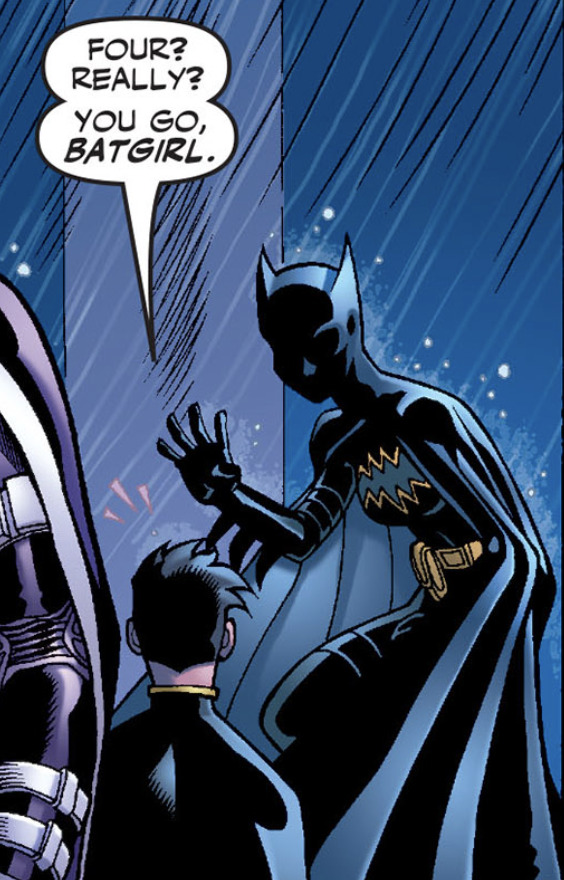
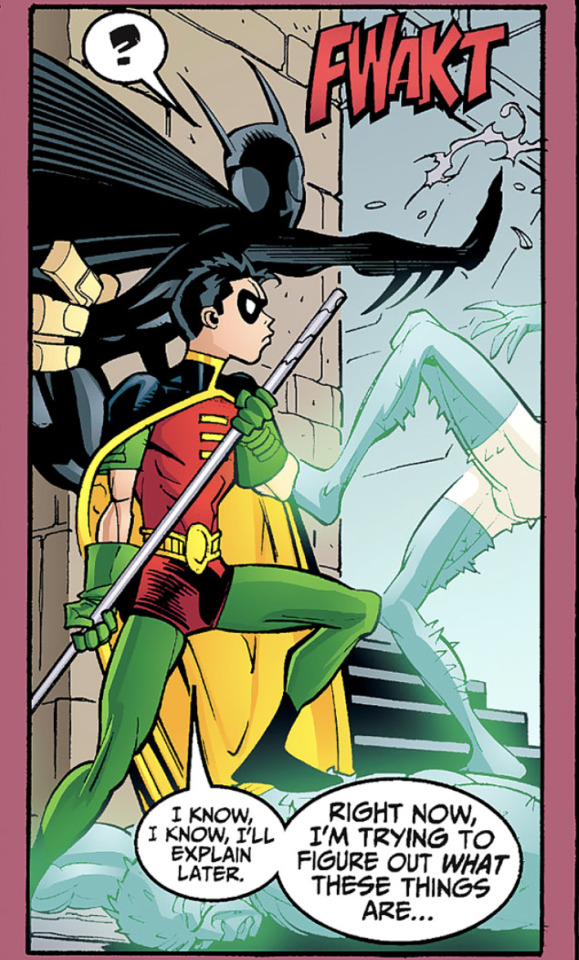
(Superman/Batman Vol. 1 #5, Superboy Vol. 4 #85)
Then… after a while, War Games happens. Gotham goes to shit, Steph dies (well, we nowadays know she didn't really, but they sure were both grieving) and so they both independently move to Blüdhaven, which leads us to the Robin/Batgirl: Fresh Blood crossover. Which has some fun little moments with them:
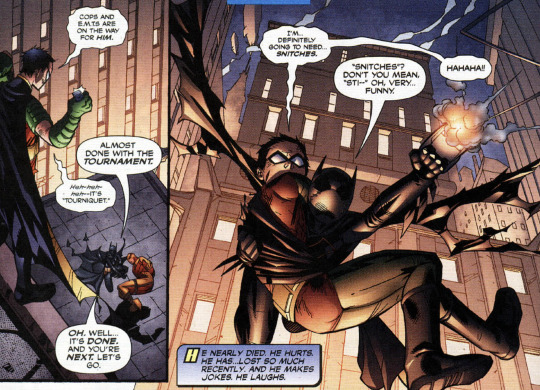
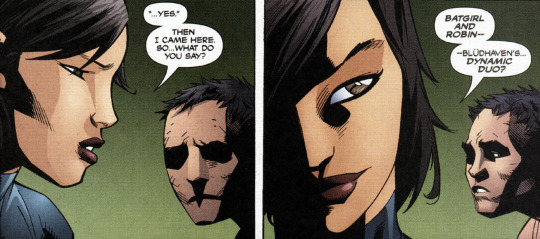
(Batgirl (2000) #58)
As well as some on the more tense side, as they both navigate mourning Steph and the clashes in their ideologies/approaches to hero work—the fact that Cass wants to be & be like Batman, and the fact that Tim absolutely does not:
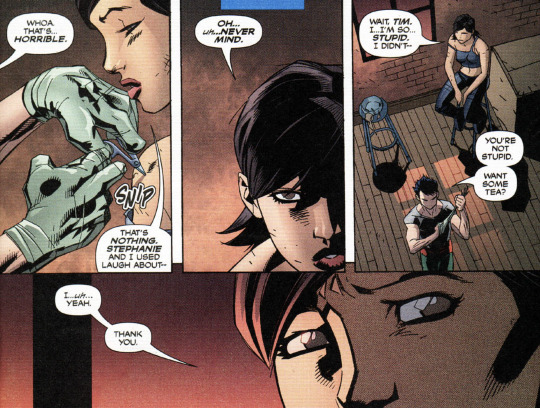
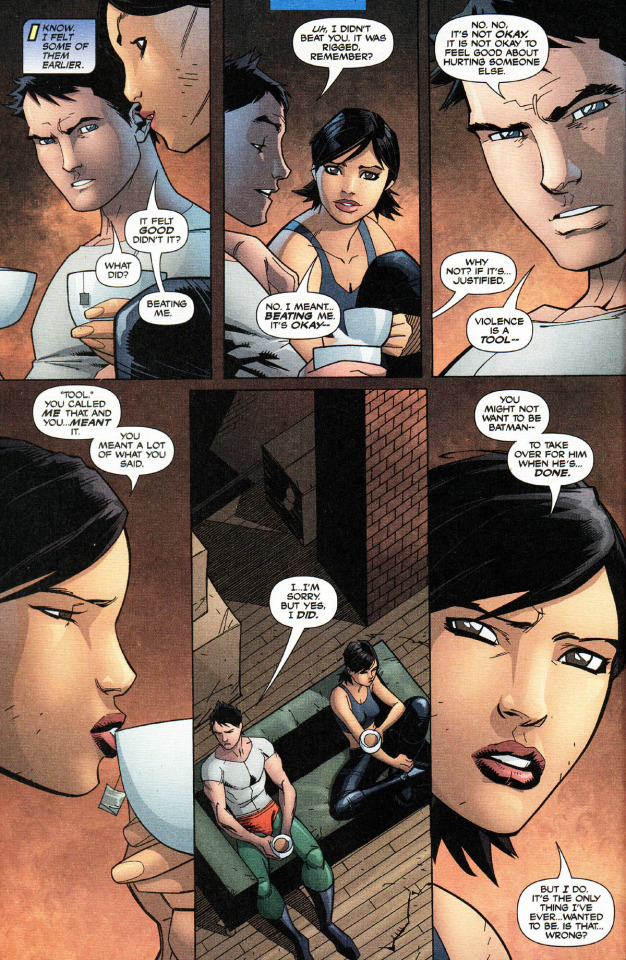

(Batgirl (2000) #59)
After the crossover they mostly do their own thing staying out of each other's ways in Blüdhaven—though they do get another little story together in this timeframe in Batman Allies: Secret Files & Origins that sort of rehashes the above conflict during some training together & a team-up.
And we DO also get the cute (and oft-mentioned by the fandom) moment where Tim mentions she frequently breaks into his house to shower & steal rice krispies (just for clarity sake, while fandom almost exclusively calls her 'Cass' largely to avoid confusion with Cassandra 'Cassie' Sandsmark, within the comics themselves both Cassandras get called 'Cass' and 'Cassie' at various points—considering Cass is the one who lives in the same city as Tim at this point in canon, that's definitely who he's talking about here)
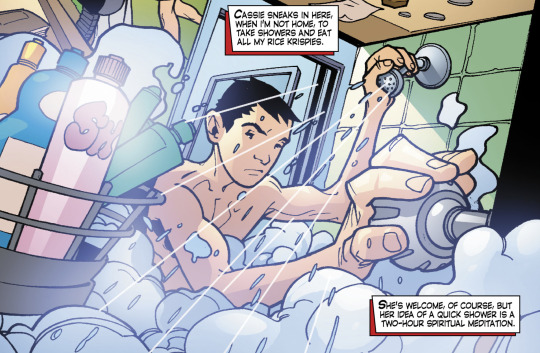
(Robin (1993) #138)
So like, at this point they are absolutely comfortable with one another and pretty close, but just, they don't see eye-to-eye on everything so it's not some flawless friendship (and I say friendship specifically because at this point we're still a few years out from them actually becoming siblings). But it's absolutely an interesting dynamic!
Then… after Infinite Crisis we get to the One Year Later/OYL era which is... bad for Cass. Terrible horrible character assassination we all refer to as the 'Evil Cass arc' which began in Tim's book. I don't wanna pull panels from it because it's just... it's bad!!!!!!!!!!!! There's a reason it got retconned into Cass having been brainwashed—because it was bad.
I guess the only thing worth bringing up here in relation to Tim & Cass's relationship though (because as mentioned, Cass gets retconned into it having been brainwashing so anything from her in this era is irrelevant/moot) is the fact that Tim was obviously very upset about the whole situation because Cass is someone he cares about and he even says he considers family.
To fast forward through that mess, when we get to the end of it and the 'oh it was brainwashing haha!' retcon, Tim was the one to have on hand a counter-serum that could free her from Deathstroke's control:
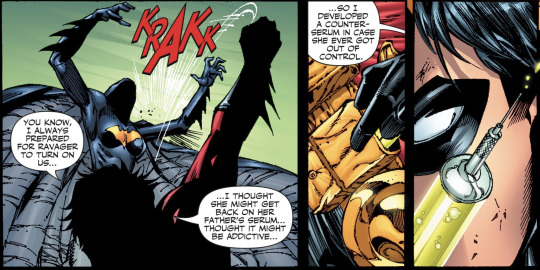
(Teen Titans Vol. 3 #44)
Once Cass is no longer forced to be evil and ooc, she gets a little mini at the end of which Bruce formally offers to adopt her (and Tim, who had earlier been adopted by Bruce, is present for this—so from this point on they go from a more general 'we're like family' to actually 'we are adopted siblings').
Buuuut then Final Crisis & Battle for the Cowl both occur and Cass gets extremely pushed aside by DC, giving up the Batgirl mantle to Steph and heading off to Hong Kong.
At which point we find out that Tim & Cass have actually kept in contact (just... off-panel) during this time when she's been out of Gotham and he's been off doing all sorts of stuff:

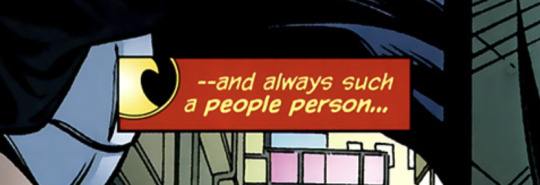
(Red Robin #17)
When they see each other in person again, Tim urges her to be a Bat again. Maybe not Batgirl if that's not what she wants, but to wear the symbol and be part of the family. (Which she does take him up on, keeping the suit he brought her and becoming Black Bat).
She pops up again at the end of Red Robin to save Tim & also help him pull off a fake assassination attempt on himself—ya know standard stuff.
And then right before the reboot we get to see them working alongside Damian and Dick in Gates of Gotham, and see one final time that yeah—these two have kept in touch after everything, and are definitely far more on one another's wavelength nowadays than they were back in the 'fresh out of War Games' era:
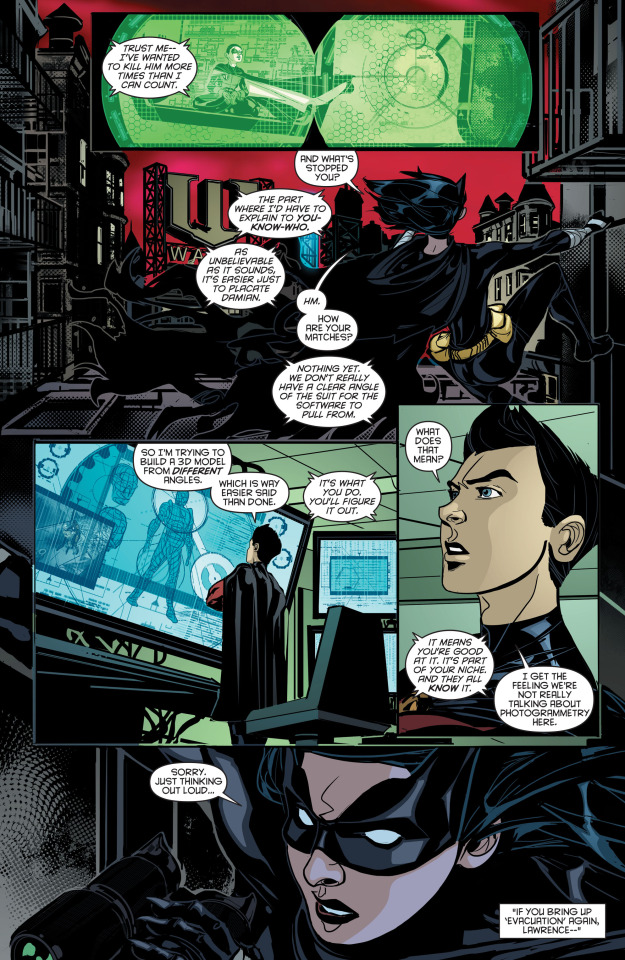
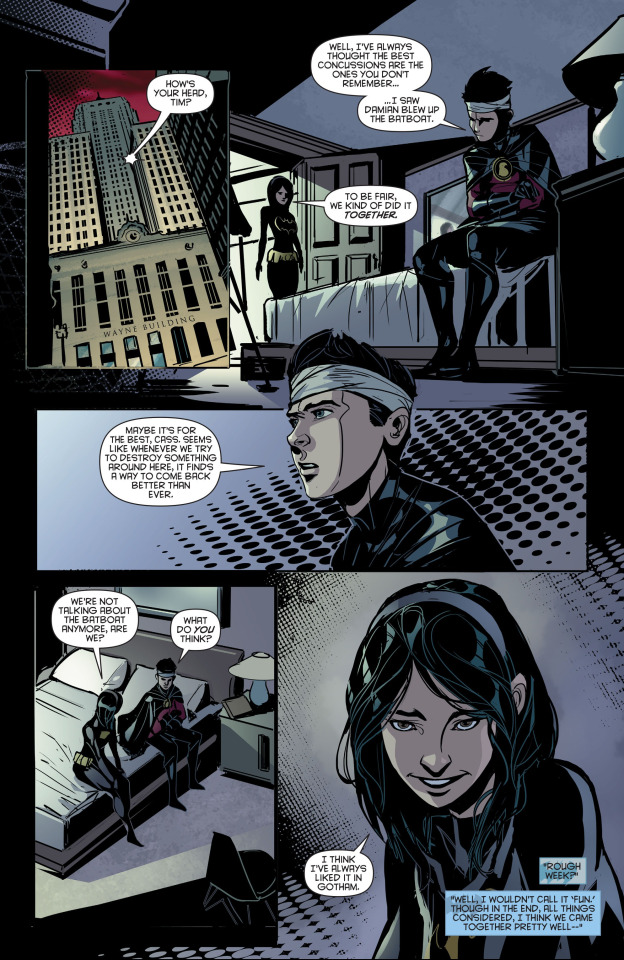
(Batman: Gates of Gotham #2, #5)
So like, does fanon over exaggerate them and their relationship? Aaaaabsolutely—that’s what fanon does. But they did definitely become close after everything they went through and had a fun dynamic together!
Sadly though, as I mentioned at the start of the post, the n52 wiped everything back to a clean slate. And while nowadays post-Infinite Frontier everyone’s histories have been restored their dynamic has never really been the same again.
227 notes
·
View notes